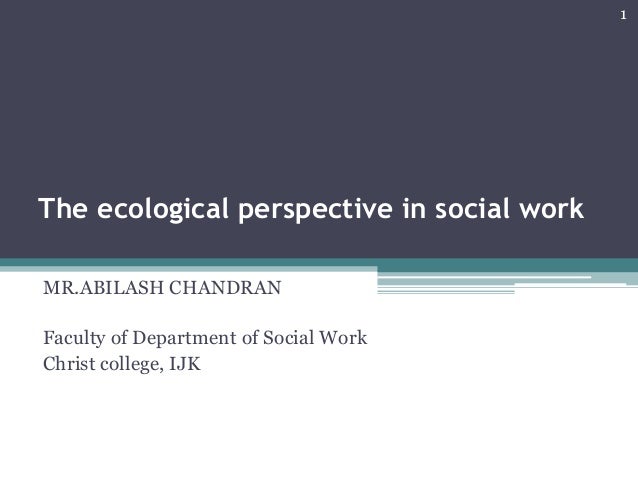Social workers may use psychodynamic theory to help clients examine the underlying causes of certain behaviors -- often considering the clients childhood -- to help explain why they act a certain way. Mainly the interactions between neighborhoods and the family of the child Leventhal Brooks-Gunn 2000.
 Ecological Perspectives In Health Research Journal Of Epidemiology Community Health
Ecological Perspectives In Health Research Journal Of Epidemiology Community Health
Ecological Perspective Theory.

Social work ecological perspective. The resultant culture and rules are expressed in values beliefs and expectations linked to environment and events over time. A broad frame work that synthesizes ideas from a number of human behavior and social work practice theories the ecological perspective offers a rich eclectic social work knowledge and practice base. A limitation of the Ecological Systems Theory is that there is limited research examining the mesosystems.
Social workers may offer different types of therapies based on psychodynamic theory including transference and dream analysis. An ecological perspective provides a lens to view patient systems in a broader context. Ecological perspective is a useful framework in which to view the individual in context with their environment.
The Ecological Perspective The ecological approach that has emerged from the early works of Germain 1973 and others Barker 1973. Often those in need of social assistance are those at the bottom of the hierarchy such as deeply impoverished families. Individuals Systems theory allows for.
A holistic approach to finding out how a person or group of people landed in the position theyre in will help a social worker by. Hartman 1976 offers a rich theoretical base which prac-titioners can translate into effective social work practice. Systems theories Those concepts that emphasize reciprocal relationships between the elements that constitute a whole.
Ecological concepts emphasize the reciprocity of personenvironment exchanges in which. Modern Social Work Theory. Ecological systems theory considers a childs development within the context of the systems of relationship that form his or her environment.
Applying this ecological perspective in social work can benefit your existing understanding. Because ecological theory emphasizes the interdependence of organism and environment it is especially suitable as a metaphor for social work given our historic commitment to the person-and-environment concept. Systems theory ecological perspective life model and ecosystems perspective.
The practice of ecological social work has been around since the late 1970s and as environmental awareness has increased in society social workers have taken on a bigger role in caring for the environment. These concepts also emphasize the relationships. The ecological perspective to social work practice requires a specific ecological vocabulary which includes such words as adaptedness stress and personenvironment fit Gitterman.
The main idea behind this concept is the notion of a person-environment fit which implies that there is at least one type of ideal. Institutions and Agents in Systems Theory Institutions They have specific processes for transmittal of environmentally supported culture and enforcement of rules. The ecological perspective is an approach to social work practice that addresses the complex transactions between people and their environment.
The Cary Institute of Ecosystem Studies defines ecology as the scientific study of the processes influencing the distribution and abundance of organisms the interactions among organisms and the interactions between organisms and the transformation and flux of energy and matter As applied to social work the ecological perspective theory approaches. Urie Bronfenbrenners Ecological Framework for Human Development is considered to be the most recognized and utilized social ecological model as applied to human development. The ecological metaphor helps the profession enact its social purpose of helping people and promoting responsive environments that support human growth health and satisfaction in.
An understanding of these childrens ecology can aid in strengthening social work service delivery for these children. Within the field of social work. According to Rogers 2013 ecological theory was originally developed by a psychologist Urie Bronfenbrenner in 1979 p.
Ecological concepts and principles enable social workers to keep a simultaneous focus on people and their environments and their reciprocal relationships not only in direct practice with individuals families and groups but also in influencing organizations and communities and in policy practice.
Halaman
Monash
Labels
-
If certain topics names or concepts appear more than once underline or highlight them and make sure they are prominent in your study guide....
-
Read all the questions BEFORE you read the passage. Diagnostics placement and demographic analysis. Compass Reading Test Success Compass ...
-
When a degree is considered terminal it means that it is the highest degree awarded in a given field. A degree that helps you to reach the ...
-
Pay us a visit for some great gear tomorrow between 12-3 PM. 4th Sunday of Easter. Nhs Senior Induction Ceremony Program Updated INDUCTI...
-
The production of speech sound is the main type of phonetics and it is known as articulatory phonetics. In the case of oral languages phone...
